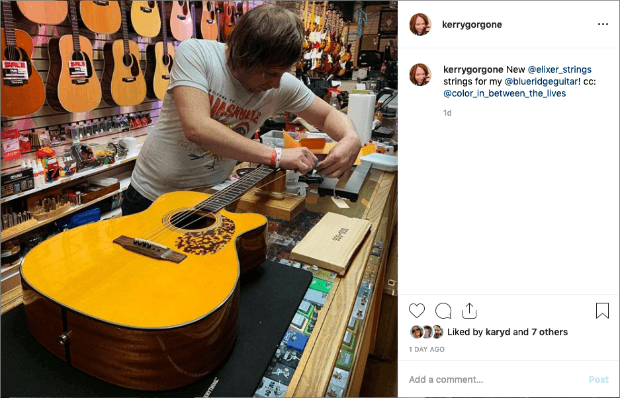By Kerry Gorgone, {grow} Contributing Columnist
I just spent $108 on guitar strings. I would never have thought guitar strings could be worth that much. No ad would have convinced me to lay down that much for strings. Here’s what motivated me to ask for them: my guitar instructor, Jason Jordan, (whom I trust) told me he only uses Elixir strings because they last for a year.
“Otherwise I’d be changing my strings after three gigs, so basically every weekend,” he explained, handing me his guitar so I could see how the strings felt. “The reason you have to change other strings so much is because dirt and oil gets into the coils: these are coated with teflon, so they stay clean.”
That was it. Suddenly, I needed Elixir strings and nothing else would do. Just to be clear, he’s not a brand ambassador for them and he doesn’t get a cut — he’s just a trusted influencer in my space who loves showing novice guitar players (like me) the ropes…well, the strings! (Sorry.)
Somewhere between strumming his teflon coated strings and laying the cash on the counter, I thought about Mark Schaefer. This, I realized, was exactly the kind of marketing he talks about in his new book, Marketing Rebellion: The Most Human Company Wins.
I am an unreachable consumer
I didn’t see an ad for Elixir guitar strings and add them to my shopping list. I didn’t even think I needed new guitar strings. It wasn’t until a human I trusted showed me the need to restring my guitar and shared his personal passion for a particular brand that I felt inspired to buy.
No ad even could have reached me. Like many people these days, I use an ad blocker online, watch TV using Netflix, Amazon Prime, and YouTube, and listen to music on Spotify. In short, I am unreachable by advertisers for the most part.
As the clerk rung up my purchase, I thought more about Mark’s “marketing rebellion,” and how I was now part of it. Looking back at my own purchase behavior over the past few months, I see that I have been part of it from the beginning.
I buy because of emotion
I buy Johnny Cupcakes tee shirts. Each one costs around $36. Target sells t-shirts for $9.99 (even less on sale), and they have fun, trendy designs. Why won’t I ever consider buying my tees at Target? Because I love Johnny Earle, the designer and founder behind the Johnny Cupcakes brand.
Johnny’s brand story is featured elsewhere on this blog, but it’s enough to say that I buy those shirts because he designs them. His personality and humanity infuse every aspect of the buying process, from shopping to unwrapping.
Then there’s my donut habit. I shop at a local bakery for donuts. We have a Dunkin’ Donuts right down the street, but I go to the local bakery instead for three reasons: first, the donuts are better. Second, the owner and employees recognize me every time I come in, even though it’s only once a week or so. Third, they make a point of letting me know how much they appreciate my business. On my birthday, they gave me free donut holes. Often, for no particular reason, they’ll throw in a free donut and say, “There’s one extra for you, see you next week!” It would take more than a coupon for me to switch my brand loyalty from the local bakery back to a chain like Dunkin Donuts.
I could go on: the nail artist at the salon I go to, the hairdresser who does my color (no, the red’s not natural), the hygienist at my dentist’s office—these people have earned my trust and, therefore, my loyalty. Their advice drives my purchase decisions.
Price only matters where there is no emotion
Recently, I saw a post on Facebook that said “traditional advertising is not dead: this restaurant is packed because it’s two-for-one entree night.” While I don’t dispute that people (myself included) will turn out for a promotion like BOGO entrees, that doesn’t mean I’ll ever come back to pay full price.
There’s a bundt cake shop that opened up a few months back that routinely mails coupons all over town for “one free bundt cake.” Guess how often I go to that shop and guess how many cakes I buy? You got it: I go when they send a coupon and I get just the free one. Not the outcome they’re hoping for and I may not be typical, but unless they make a real connection with me and exhibit how they make my community a better place, I won’t spend my money there.
Since reading Marketing Rebellion, I’ve gone over a lifetime of buying decisions and come to this realization: I’ve been a marketing rebel for years! Spend some time thinking about the way you shop, then align that experience with your perspective as a marketing professional and the truth becomes impossible to deny: we are in the midst of a seismic shift, and much of the marketing we do no longer works.
If you haven’t already, pick up a copy of the book. I recommend the audio version. If you want to learn more about what Marketing Rebellion is about before you buy, check out this podcast interview I did with the author, Mark Schaefer. But before you read, a warning: Some books change you, making it impossible for you to look at the world the same way. This book is one of them.
I joined the marketing rebellion, and you should, too. See you in the fray!

Kerry O’Shea Gorgone is a writer, lawyer, speaker and educator. She’s also Director of Product Strategy, Training, at MarketingProfs. Kerry hosts the weekly Marketing Smarts podcast. Find Kerry on Twitter.
The post I Joined the Marketing Rebellion (and You Should, Too) appeared first on Schaefer Marketing Solutions: We Help Businesses {grow}.
from {grow} https://feeds.feedblitz.com/~/599494750/0/markgrow~I-Joined-the-Marketing-Rebellion-and-You-Should-Too/

No comments:
Post a Comment